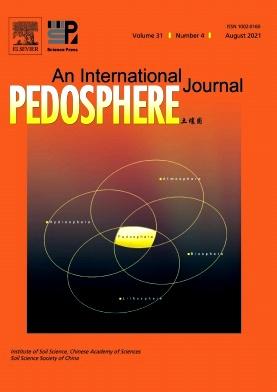Microbial genes for degrading plant-derived carbon are a key factor affecting soil respiration and temperature sensitivity in plateau peatlands
IF 5.2
2区 农林科学
Q1 SOIL SCIENCE
引用次数: 0
Abstract
Peatlands on the southwestern plateau of China are important carbon sinks for high-altitude terrestrial ecosystems in Asia. However, the specific microecological mechanism responsible for alterations in carbon processes in this region due to the simultaneous impacts of global warming and drought has not been fully elucidated. Investigating this mechanism will improve our understanding of carbon cycle feedback in peatland ecosystems, as it is affected by changes in hydrology and temperature, especially in vulnerable habitats. This study examined the influence of soil carbon decomposition functional microorganisms on soil respiration and temperature sensitivity (expressed as Q10) in high-elevation peatlands using field investigations, simulated warming experiments, and metagenomic sequencing. We found that hydrothermal conditions had a significant effect on soil respiration, leading to an increase in cumulative soil respiration as soil moisture and temperature increased. Soil moisture affected soil respiration and soil organic carbon mainly through soil microorganisms, with a predominance of carbon-decomposing genes. We found that genes regulating the decomposition of plant-derived carbon such as cellulose and lignin were the critical factor influencing Q10 in peatlands. Genes involved in cellulose and lignin decomposition showed a significant positive correlation with Q10 (P < 0.05), while genes involved in hemicellulose decomposition showed a significant negative correlation with Q10 (P < 0.05). Specifically, genes such as ACO, xylF, and hpaE, which are involved in lignin decomposition, and glgB, which is responsible for cellulose decomposition, showed significant positive correlations (P < 0.05) with Q10. Conversely, the gene uxaC, involved in the decomposition of hemicellulose, showed a significant negative correlation (P < 0.05) with Q10. Finally, we analyzed the relevant carbon metabolic pathways and found that although they were affected by water, they were not significantly related to Q10. In short, this research highlights the importance of microorganisms with genes for decomposing plant-derived carbon in influencing carbon emissions in plateau peatlands during periods of warming.
降解植物碳的微生物基因是影响高原泥炭地土壤呼吸作用和温度敏感性的关键因素
中国西南高原泥炭地是亚洲高海拔陆地生态系统的重要碳汇。然而,由于全球变暖和干旱的同时影响,导致该地区碳过程变化的具体微生态机制尚未完全阐明。研究这一机制将提高我们对泥炭地生态系统中碳循环反馈的理解,因为它受水文和温度变化的影响,特别是在脆弱的栖息地。采用野外调查、模拟增温实验和宏基因组测序等方法,研究了高海拔泥炭地土壤碳分解功能微生物对土壤呼吸和温度敏感性(表达为Q10)的影响。热液条件对土壤呼吸有显著影响,随着土壤湿度和温度的升高,累积土壤呼吸增加。土壤水分主要通过土壤微生物影响土壤呼吸和土壤有机碳,且以分解碳基因为主。我们发现,调控植物源碳(如纤维素和木质素)分解的基因是影响泥炭地Q10的关键因素。参与纤维素和木质素分解的基因与Q10呈显著正相关(P <;0.05),而参与半纤维素分解的基因与Q10呈显著负相关(P <;0.05)。具体而言,参与木质素分解的ACO、xylF和hpaE等基因与负责纤维素分解的glgB呈显著正相关(P <;0.05)。相反,参与半纤维素分解的uxaC基因则表现出显著的负相关(P <;0.05)。最后,我们分析了相关的碳代谢途径,发现它们虽然受到水分的影响,但与辅酶Q10的相关性不显著。简而言之,本研究强调了具有分解植物源碳基因的微生物在变暖期间影响高原泥炭地碳排放的重要性。
本文章由计算机程序翻译,如有差异,请以英文原文为准。
求助全文
约1分钟内获得全文
求助全文
来源期刊

Pedosphere
环境科学-土壤科学
CiteScore
11.70
自引率
1.80%
发文量
147
审稿时长
5.0 months
期刊介绍:
PEDOSPHERE—a peer-reviewed international journal published bimonthly in English—welcomes submissions from scientists around the world under a broad scope of topics relevant to timely, high quality original research findings, especially up-to-date achievements and advances in the entire field of soil science studies dealing with environmental science, ecology, agriculture, bioscience, geoscience, forestry, etc. It publishes mainly original research articles as well as some reviews, mini reviews, short communications and special issues.
 求助内容:
求助内容: 应助结果提醒方式:
应助结果提醒方式:


